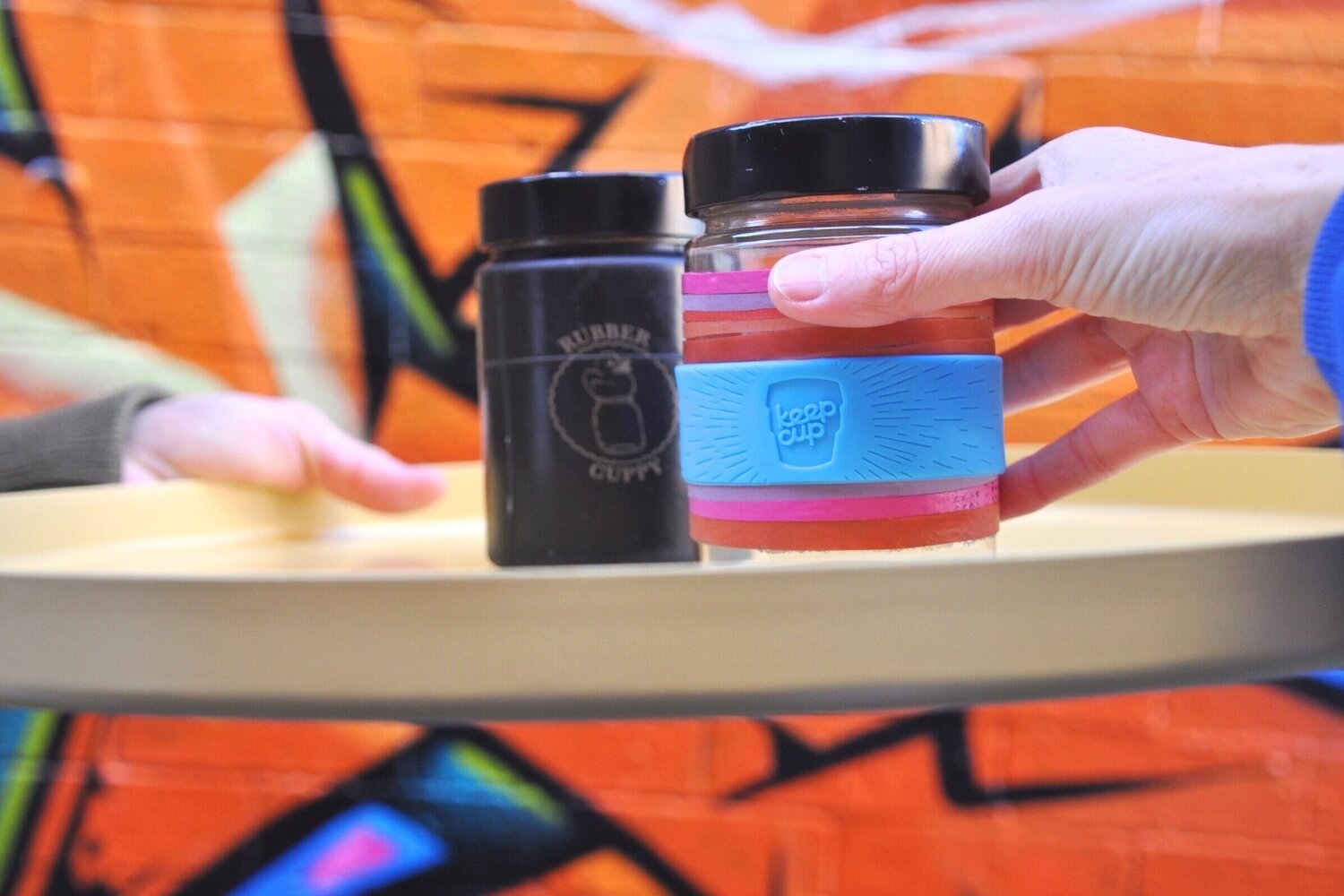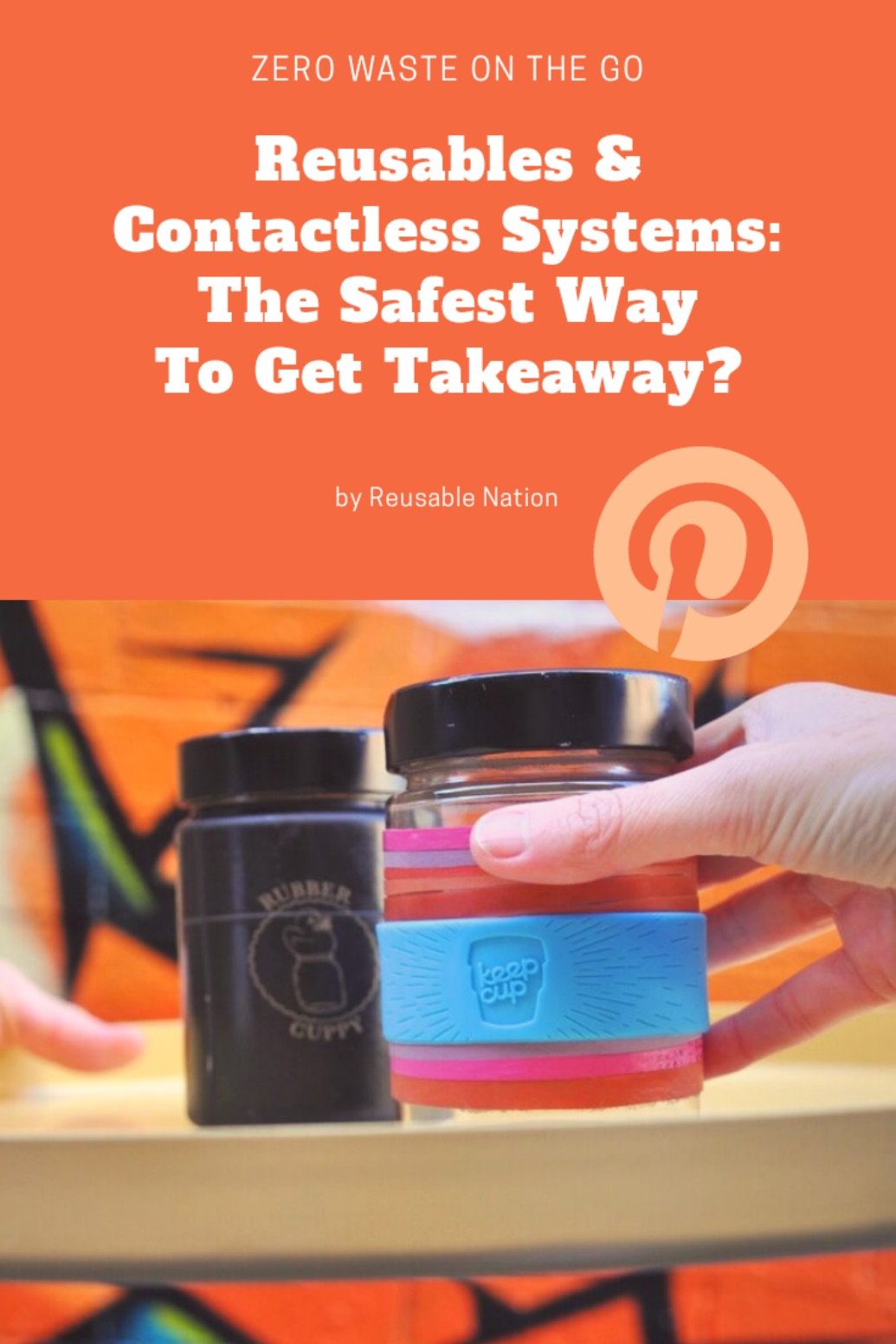Are Reusables Safe?: Can BYO Cups & Containers Be Contagious?
COVID-19 has had many, including us, questioning whether it is safe to use reusables and has seen many cafes and restaurants only allowing single-use. We look into whether reusables can be contagious, share how to do contactless transfers of food and coffee, and the best way to clean your reusables.
Our reusables have been packed away for a few months, and we have been holed up in our apartment getting takeaway food in disposable containers like everyone else. Although we could have not gotten any takeaway and only cooked at home over this time, we chose instead to support our struggling local cafes and restaurants who have always accepted our reusables and gone out of their way to serve us with zero waste coffees and food.
I (Vicky) hardly had takeaway coffees anyway and only made coffee at home over these months and David got a few takeaway coffees in compostable coffee cups and disposing of them in the green bin absolute legends Northcote Bakeshop specifically set up so that they go to a commercial composter for composting.
We have mostly been only getting food in home compostable cardboard or corn containers (luckily our fav local restaurants are eco-aware) and composting these at home, although we have had a few fails and ended up with a few plastic containers and little plastic sauce pots, both of which we’ll reuse.
Here we are half way through the year and we’re longing to get our reusables out again! So, we have been reading up whether it is safe to use them and how we can use them safely because we’re over all the disposables! Here’s what we found…
Is Using Single-Use Safer Than Using Reusables?
The short answer? No it isn’t and reusables can be used safely. We share the science behind this and what various government agencies have to say about it below.
What do various government agencies and the science have to say about using single-use and reusables during coronavirus?
In its COVID-19 advice and FAQs Information for EHOs and food businesses, the Victorian Government says: “There is currently no evidence to suggest there is any benefit in switching to disposables. The most effective measures you can take are practising good hand hygiene and cleaning, with particular focus on shared, frequently touched surfaces.”
According to the CDC, surface transmission risks are low. It states that although “it may be possible that a person can get COVID-19 by touching a surface or object that has the virus on it and then touching their own mouth, nose, or possibly their eyes, transmission of the virus from surface contact has never been documented”, with it recommending “cleaning and disinfecting surfaces as precautionary measures and hand washing as the most important prevention measure for surface contact transmission”.
According to Upstream, “the FDA Guidance on Best Practices for Retail Food Stores, Restaurants, and Food Delivery Services during the COVID-19 Pandemic focuses on social distancing, foodware washing and sanitising, cleaning and sanitising, and PPE for workers” and “no mention is made of any threats posed by reusable bags, cups, or cutlery or other reusable products”.
It adds that “the California Department of Public Health (CDPH) states: “The CDC, FDA and CDPH are not aware of any reports at this time that suggest COVID-19 can be transmitted by food or food packaging.””
Single-use products are also not promoted in the National Restaurant Association’s Guide to Reopening re: COVID-19 according to Upstream, with it focusing on cleaning, disinfecting, and social distancing
Studies have shown that disposable products are not safer than reusable ones. COVID-19 can be found on both disposable and reusable materials, and plastic is one of the materials on which it survives longest according to studies. One study found that the virus is infectious for up to 24 hours on paper and cardboard and between two and three days on plastic and stainless steel, while another one found that it is not infectious on print or tissue paper, but is infectious for up to one day on cloth, up to four days on glass, and up to seven days on plastic and stainless steel.
Recently, over 115 health experts signed a statement addressing the safety of reusables during COVID-19, which you can read in full here, but basically it concludes that “based on the best available science and guidance from public health professionals, it is clear that reusable systems can be used safely by employing basic hygiene”.
Boomerang Alliance notes that there is no government directive in Australia that requires you to stop accepting BYO reusable items during COVID–19 and it is advising cafes and restaurants to accept clean reusable cups without the lid, do a contactless exchange, make use of ‘swap n go’ cup network schemes, where cups are stored and sanitised in-house, and/or offer a container take-back program, allowing regular customers to borrow a container for a deposit, or implement an external container network scheme like Returnr or Retub.
The most hygienic food-ware for your meals is the kind that can go through a dishwasher, according to Upstream, an organisation building a movement to make throw away go away, as “from production to packaging to shipping,as “from production to packaging to shipping, ” as “from production to packaging to shipping, disposable items pass through a countless number of hands by the time they reach a restaurant”.
It points out that “single-use products like plastic cups, plastic-wrapped utensils, or plastic bags are handled by several retail workers before reaching the customer. Whereas, reusable products provided by a retailer, like cups, utensils, and to-go containers, must be adequately cleaned and sanitised according to food safety regulations”.
Also if a contactless system is implemented for using reusables this would be the safest as only you are touching your reusable - you are not touching something that the server and kitchen staff have touched.
How BYO Cups & Containers Can Be Accepted Without Touching Them
How to make a contactless coffee:
Pour the coffee shot into an in-house vessel
Have the customer set their cup on the counter
Pour the shot into the cup without touching it
Pour steamed milk on top
Have the customer place their own lid on
We have also seen cafes using trays that customers put their cup on, with the barista only touching the tray and not the cup. Counters and trays are disinfected between use.
Similarly, with reusable containers you could have the customer put it on a tray to take into the kitchen to be filled up, or the customer can hold the container up hovering it over the counter while the server puts the food straight into it using tongs.
With reusable bread bags, you can hold it open for the bread to be dropped into the bag. And continue using reusable shopping bags when grocery shopping by simply bagging your own groceries.
How to Clean Your Reusables
“Normal washing of dishes in hot water (or better still, a dishwasher) using detergent is likely to completely inactivate any coronavirus present”, according to the Victorian Government.
Upstream notes that food service already has strict safety requirements: “State food safety codes require extensive ware washing and sanitising at high heat that meets the level of hygiene and disinfection required by the FDA and CDC.”
And it shares that regarding its reusable container washing system, Tom Szaky, CEO of Terracycle/Loop, says, “We are protecting for other pathogens and concerns that are way more potent than Covid.”
The statement addressing the safety of reusables during COVID-19 signed by over 115 health experts agrees, noting that reusable products are easily cleaned. It notes: “Most common approved household disinfectants should be effective for disinfecting hard surfaces, including reusable items, with such surfaces being cleaned thoroughly using a detergent or soap and hot water prior to disinfection if they are visibly dirty. Dishwashers and washing machines should be effective if operated according to manufacturers’ instructions and, in the case of laundry, using the warmest appropriate water setting for the items and drying items completely. Similarly, washing hands with soap and water or an alcohol-based hand rub, and then avoiding touching your eyes, mouth, or nose are effective ways to protect yourself.”
Properly clean reusable shopping bags, produce bags, reusable coffee cups, reusable containers, and any other reusables you use after every use.
Other Ways To Reduce COVID-Related Waste
Ask for no bag when picking up takeaway and take your own reusable bag instead
Ask for no cutlery or paper napkins
Establishments: Don’t automatically give a brown paper or plastic bag to everyone. Only give one if asked for or if really necessary and If delivering independently, Boomerang Alliance has shared this great idea: “drivers can load food into returnable bags or boxes, and at the home, ask the customer to remove the items. While this may seem tedious, think about how wasteful it is for a bag to be used for 5 minutes! Not to mention the extra cost for you”.
Establishments: Also don’t give out straws and cutlery unless asked for
Buy or make reusable fabric face masks that can be washed in the washing machine and reused over and over again instead of single-use face masks that end up in landfill
If your local secondhand store is not be taking donations, don’t throw out usable items you want to get rid of, find a way to sell or give it away without coming into contact with the other person. Contactless sharing methods include: placing it on your porch or nature strip or in the foyer of your apartment building with a sign saying Free Please Take Me or posting in an online sharing group or selling online and organising contactless pickup with the person who wants it or buys it (cash can be exchanged from a distance - wash your hands after touching)
*we maintain this site in our free time and support in any way, shape or form means a lot and helps us keep it running, whether it is using an affiliate link when investing in something, sharing our content, or buying us a coffee on Ko-fi.



